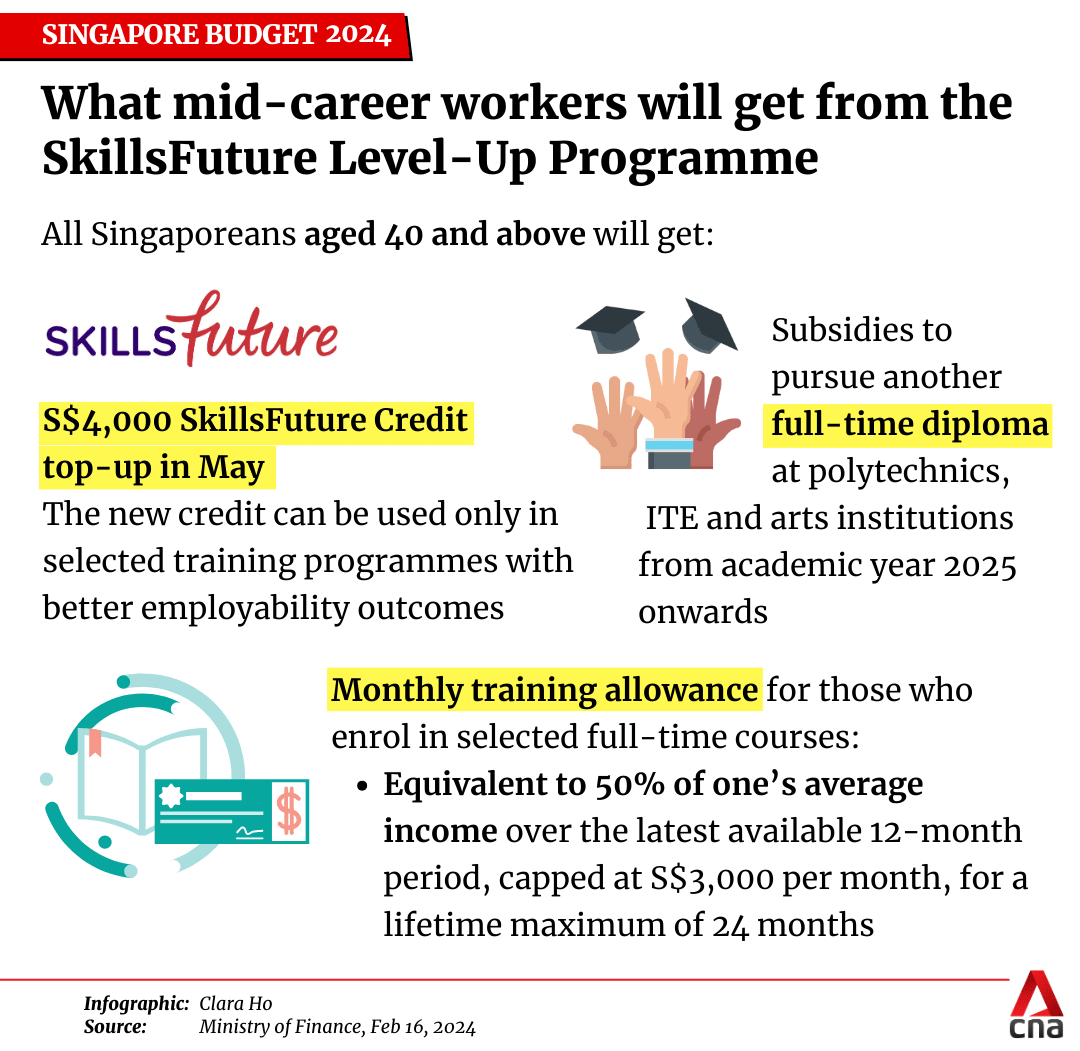Snap Insight: Budget 2024 - SkillsFuture upgrade may be just what Singaporeans need to take upskilling seriously
With the SkillsFuture Credit top-up, access to subsidised diploma and a training allowance, individuals could be pulled towards upskilling proactively instead of being pushed by circumstances, says NTU economics assistant professor Chua Yeow Hwee.


This audio is generated by an AI tool.
SINGAPORE: The SkillsFuture Level-Up Programme is a bold commitment to support continuous learning and professional development for Singapore’s workforce.
Deputy Prime Minister and Finance Minister Lawrence Wong announced in his Budget 2024 speech on Friday (Feb 16) that mid-career Singaporeans aged 40 and above will receive a S$4,000 top-up in SkillsFuture credit, sizeable subsidies to pursue a second full-time diploma and a monthly training allowance for those who enrol in selected full-time courses.
This initiative has the potential to inspire individuals to take upskilling more seriously - to pull towards upskilling proactively instead of being pushed by circumstances. As individuals assume responsibility of their learning, an increase in productivity and innovation in the economy should follow.
The focus on proactive learning is no surprise. The Progressive Wage Model is built on similar thinking, with emphasis on a skills-income ladder rather than a traditional minimum wage scheme seen overseas.

OPPORTUNITY COST OF UPSKILLING
There are two key economic factors that could contribute to the paradigm change in upskilling.
Working adults are all too familiar with the concept of opportunity cost - the benefits of upskilling and reskilling are seldom guaranteed, but the sacrifices are plain to see. Beyond the time and effort invested in training, there is often a loss of income during this period.
Many mid-career Singaporeans, especially those with school-going children and elderly parents, will thus find it challenging to pursue a diploma and upskill due to their financial obligations.
On the one hand, a monthly training allowance will directly alleviate these financial concerns, enabling them to enrol in classes with greater confidence. On the other hand, the credit, subsidies and allowances are more confined in scope to selected programmes, notably full-time courses, for more quality learning and hopefully better employability.
Amid economic uncertainty and the spectre of layoffs, it will certainly cost workers more if they lack relevant and transferable skills.
INERTIA AND INACTION
The remaining challenge then will be our own behavioural biases.
We are often aware of what is beneficial for us - we know we should save for rainy days, exercise more regularly and continuously enhance our skills.
Yet, due to behavioural biases like the status quo bias, we often struggle to make meaningful progress towards our goal. Consequently, we may lack the motivation to do meaningful action such as upskilling until it is too late, where we face challenges in the labour force.
As a major policy initiative, the SkillsFuture Level-Up Programme has the ability to mitigate these behavioural biases as skills upgrading is made more salient.
With the attractive financial benefits, the initiative can help overcome the inertia associated with inaction. Additionally, households might feel that they are missing out on the benefits and subsidies should they choose not to pursue another full-time course.
Coupled with the influence of peer effects, this could eventually create a movement of continuous learning. Let us keep the conversation going.
Chua Yeow Hwee is an Assistant Professor in Economics and Deputy Director of the Economic Growth Centre at the Nanyang Technological University (NTU). The opinions expressed are those of the writer and do not represent the views and opinions of the institutions he is in.


















